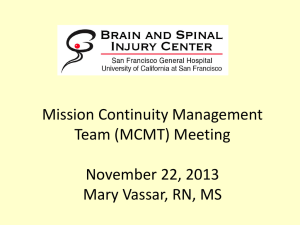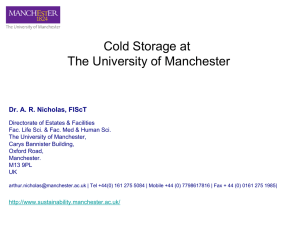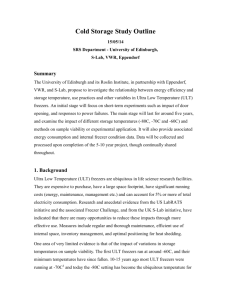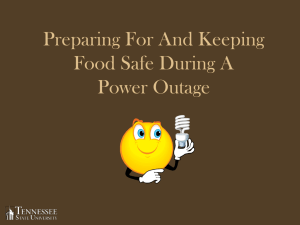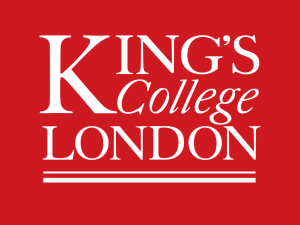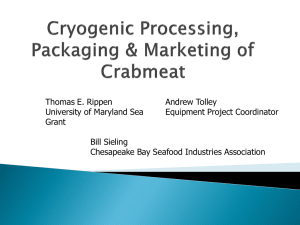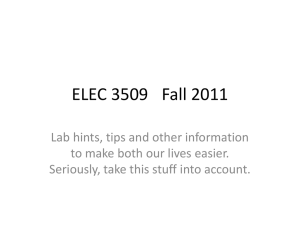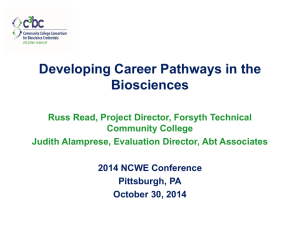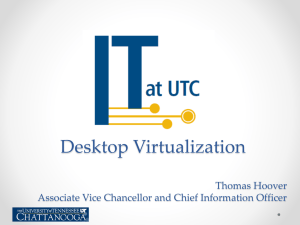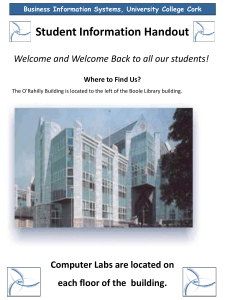2014 National Freezer Challenge
advertisement
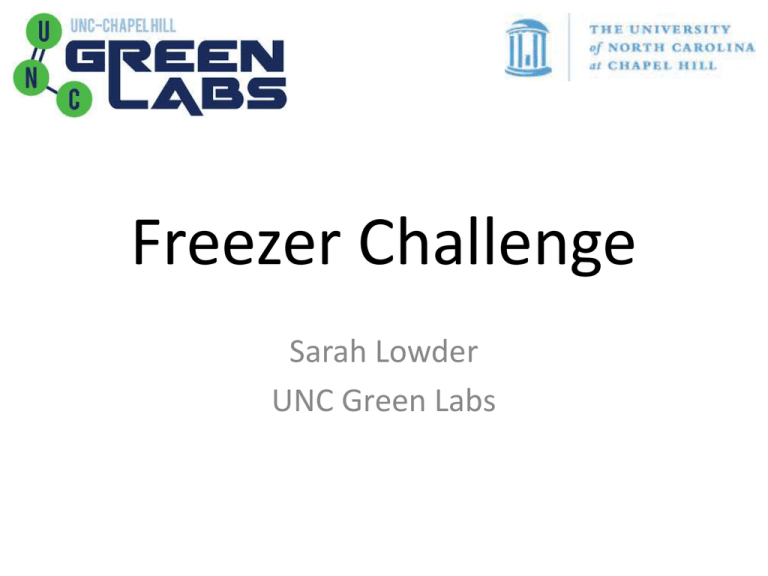
Freezer Challenge Sarah Lowder UNC Green Labs Sustainability Triangle Field Site Program Intern Goals: - Identify areas of energy and material consumption that can be reduced among the laboratories on campus, particularly regarding freezers Develop a plan to enact a Freezer Challenge program at UNC Recruit Eco Champions and initialize contact with labs in order gain as many participants as possible Enroll UNC in the 2014 National Freezer Challenge Competition UNC Freezer Challenge Purpose: To reduce energy consumption in campus labs A single ultra-low temp freezer can use the same amount of energy as a large single family household. How to reduce energy consumption of freezer units: Clean (improve airflow/defrost) or replace old units and practice good maintenance Remove old / unnecessary samples to -20°C or dispose -80 to -20 is a 75% energy savings Combine and share freezer space between labs Increase temp from -80 to -70°C Can save 2-4 kWh/day (20-40¢) and increase the lifespan of the freezer by reducing the stress on the compressor and has been seen to not affect the stability of samples like microbial cultures, proteins, yeast strains, cell lysates, etc. Participating labs will work to make the greatest reduction in their energy consumption. Scoring will account for the size and number of units in each lab. The Competition Labs with the greatest reduction in energy usage on campus will win the competition. A request was submitted to UNC Renewable Energy Special Projects Committee (RESPC) to possibly generate subsidies for the initiatives. We will report our results as part of the 2014 National Freezer Challenge, competing with many other universities that have also introduced this program. UC Davis, CU Boulder, Harvard, U Penn, UCSB, Penn State, MUSC, CDC, and more! Progress Collection of Freezer Challenge information and maintaining contact with Kathryn Ramirez-Aguilar from CU Boulder Creation of website, brochure, and other outreach materials Gathering Eco Champions We have 15 so far! Contact with the departments on campus Presented at Pharmacology and Genetics Department Meetings Forming RESPC funding request The Competition In order to coincide with the National Competition, the Freezer Challenge shall run from September 1st, 2014 – August 31st, 2015. Phase 1: Freezer Swap Phase 2: Good Maintenance Phase 3: Temperature Tune Up Phase 1: Freezer Swap A 15 year-old freezer with 18 cubic foot capacity uses an average of 28 kWh per day A newer, more energy-efficient model uses an average of 13 kWh per day. Swapping could save hundreds of dollars in energy costs and 5475 kWh each year! We are working with UNC RESPC and other sources to try to subsidize the replacement of old freezers on campus. Phase 1: Freezer Swap Action Items: Provide RESPC any information they require in order to secure funding approval. Email departments; have an email sent over the listservs in order to inform the labs about this initiative. Require any labs interested in participating to provide an Eco-Champion for their lab Give interested labs a list of energy efficient options that they may (or may not) choose from for the swap. Phase 2: Good Maintenance The Refrigeration Shop estimates that HALF of the UNC freezers have seals that leak or have failed completely. Encouraging proper and preventative maintenance can mitigate energy lost through improper use and increase freezer lifespan through reduced compressor stress. - Cleaning filters and coils, allow space around edges of freezers, defrosting overly frosty freezers, removing old or unnecessary samples, taking inventory, consolidating and retiring freezers Phase 2: Good Maintenance Action Items: Provide labs with information on what good maintenance items they should perform, where they can get preventative maintenance or repairs, and any incentives/trainings available for this phase. Recruit the Refrigeration Shop in order to add training, share information on the benefits, and push the initiative through a source the labs trust. Phase 3: Temperature Tune Up Raising a freezer from -80° C to -70° C saves 2-4 kWh/day, the same amount of energy required to run a full-sized -20 degree freezer. It also reduces the stress on the compressor, increasing freezer lifetime and reducing the risk of compressor failure. -70° C used to be the standard temperature some years ago and the samples like microbial cultures, proteins, yeast strains, cell lysates, and more can be stored for years at this temperature without compromising sample stability. Phase 3: Temperature Tune Up Action Items: Identify UNC labs that have freezers already operating at -70°C Recruit members from the Refrigeration Shop to verify benefits to the freezers Provide the list of samples that the other labs keep at -70° or warmer for reference Reporting Results On the website: http://www.wastereduction.unc.edu/GetInvolved/GreenLabs/FreezerChallenge Freezer Challenge Awards The Frigid Four Frost Champion This prestigious award goes to the lab that has the most points from all campaigns relative to the number of ULT's in the lab. Frost Victor The lab with the most total points for all freezer week programs will be deemed the Frost Victor. Campus Champs For the department that earns the most total points, relative to the number of ULT’s in the departments. Campus Victors The department with the most total points accumulated. Special Awards Rip Van Winkle Oldest sample discarded Frosty the Snowlab Submit the best picture from you epic freezer adventures Pot O' Gold Most valuable item rediscovered General Action Items: Post a list of labs with Eco Champions and their departments to begin recognizing those involved and increase competitive spirit. Send the survey out so that labs can begin listing the initiatives in which they are participating Create stickers, magnets, banners, etc. for labs to display indicating their involvement and reiterating best practices. Send out Green Labs Best Practices Guide Inform Eco Champions of the other Green Labs initiatives. Questions?
